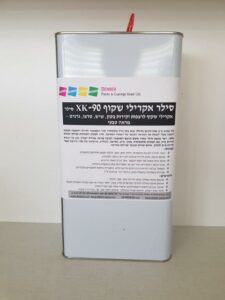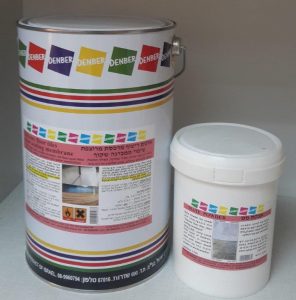Acrylic sealer for stone concrete – article
Acrylic sealer for stone concrete – article
Pure acrylic to dilute with water.
A water-soluble basic acrylic sealer that is transparent and does not change the shade of the foundation. It is possible to change the shade using pigments and after drying it is waterproof. Therefore, the use of materials such as water-repellent sealer or exterior wall sealer is common among waterproofing contractors. The clear advantage of the acrylic sealer over the use of silicone oil-based sealers, for example, is the ease of working with it. Odorless, washed with water in case of leakage during application. Its excellent resistance to prevent the penetration of rainwater – therefore it is a good solution as a sealer – a primary sealer and on top of that an additional layer of transparent acrylic sealer to complete the seal.
Preparing an acrylic sealer is relatively simple: mix an acrylic polymer material together with special additives and dilute with water. In the drying process, the water evaporates and the sealer dries and becomes waterproof (which provides the sealing effect). Pay attention – the water evaporates and there is a change in the color of the acrylic sealer, which becomes completely transparent.

Acrylic sealer for stone concrete. www.denber.net
Sealing – the purpose of sealing is to prevent the infiltration of rainwater, water from water reservoirs and/or nearby buildings. The sealing can be done on roofs and balconies, external walls (above and below ground), internal walls, underground structure (pillars, shelters, basements, parking lots, elevator shaft or service shaft (electrical/water/gas plumbing, etc.), kitchens, utility room and laundry, water reservoirs (drinking, irrigation, firefighting, etc.).
Until about forty years ago, tar was a solution for sealing underground roofs and external walls, since the invention of bituminous sealing sheets (a by-product of oil such as tar, sold as a sheet instead of tar liquid, and more convenient for application on underground roofs and external walls). Today, with the development of technology, it is better and recommended to seal roofs with a white polyurethane membrane ” Danversil 1 ” which also seals perfectly, is resistant to standing water and most importantly is not black that absorbs heat but white that repels heat and prevents the roof and the apartments under it from heating up.
Sealing external and internal walls – in contrast to sealing roofs and balconies, we would like to seal internal and/or external walls with aesthetic and convenient means for application, for example, in those failure points of moisture in a shared building:
Leaks from the roof and balconies – sealing the flooring with a transparent sealant made by a Denver company called: ” Balcony Flooring Sealant ” and painting exterior walls using an acrylic sealer.

Sealing balcony flooring from rain. www.denber.net
Penetrates and seals, UV and abrasion resistant
Leaks from utility rooms and/or hatch rooms – correct and high-quality sealing using acrylic paint and acrylic sealer.
Note : Acrylic paints are usually non-toxic. And the use of acrylic sealer is recommended for sealing external walls. Nevertheless, it should be noted that there are acrylic paints that contain toxic additives that are not recommended for painting bedrooms. and intended for painting and sealing bathrooms, utility rooms and balconies.
One of the advantages of using an acrylic sealer is its resemblance to watercolors, which gives it an aesthetic and clean look. More details about acrylic sealer on the Denver Paints website: www.denber-paints.co.il
Denber Projects Company – Execution with over 30 years of experience.

 English
English עברית
עברית Русский
Русский